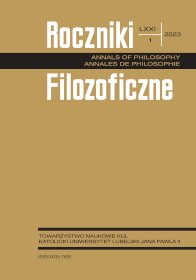KONCEPCJA UCZUĆ EGZYSTENCJALNYCH MATTHEW RATCLIFFE’A
MATTHEW RATCLIFFE’S CONCEPTION OF EXISTENTIAL FEELINGS
Author(s): Mateusz CHRÓLSubject(s): Contemporary Philosophy, Existentialism, Phenomenology
Published by: Towarzystwo Naukowe KUL & Katolicki Uniwersytet Lubelski Jana Pawła II
Keywords: existential feelings; phenomenology; philosophy of psychiatry; sense of reality;
Summary/Abstract: The aim of the article is to present and critically scrutinize the conception of existential feelings offered by the contemporary phenomenological philosopher of psychiatry — Matthew Ratcliffe. Existential feelings are a special class of affective states that grant an emotional coloring to the subjective experience of reality. They are pre-reflective by nature and constitute the implicit background of phenomenal consciousness, which remains outside the scope of attention in everyday experience. These feelings are closely related to emotions, determining the types of intentional objects contained in emotional states and determining the repertoire of emotions that can be experienced. The most important existential feelings that Ratcliffe distinguishes are: (1) a sense of reality that is the pre-reflective and phenomenal impression that the world exist; (2) a sense of belonging that is the pre-reflective and phenomenal impression of one’s own existence, embedded in the world among people and things. These two categories are fundamental components of the subject’s firstperson experience, thereby determining his relationship to other people and to reality in its most general sense. In this article, I present the main features and types of existential feelings. I also pay attention to the special role of psychopathology in the analysis and justification of the existence of such feelings. Therefore, following Ratcliffe, I describe how certain aspects of existential feelings are disintegrated in mental disorders such as depression and schizophrenia. I also show the difference between the phenomenological and cognitive-behavioral approaches to mental disorders. Referring to neurobiological research, I try to indicate potential neural correlates of existential feelings. The text is completed with critical remarks on Matthew Ratcliffe’s concept of existential feelings. The identified flaws and shortcomings in Ratcliffe’s philosophical theory are held to suggest future prospects of its development.
Journal: Roczniki Filozoficzne
- Issue Year: 71/2023
- Issue No: 1
- Page Range: 345-373
- Page Count: 29
- Language: Polish

